Recipes & Specifications
Streamline Your Formulation Workflow with our Real-Time Recipe Management & Development System, Automated Label Updates, and Supplier Management system.
- Keep supplier information current with automatic renewal reminders and certification expiry alerts.
- Instantly update nutritional, cost, and allergen details as you develop recipes.
- Effortlessly generate labels that adjust in real-time with recipe changes.
Tailored Digital Solutions for Diverse Food Industry Segments
At FoodChain ID, we understand the unique challenges and opportunities the food and beverage industry presents. Our
recipe management system and development tool
, along with other digital solutions for food industries, are crafted to cater to various segments within this dynamic industry, ensuring each sector benefits from our tailored services.

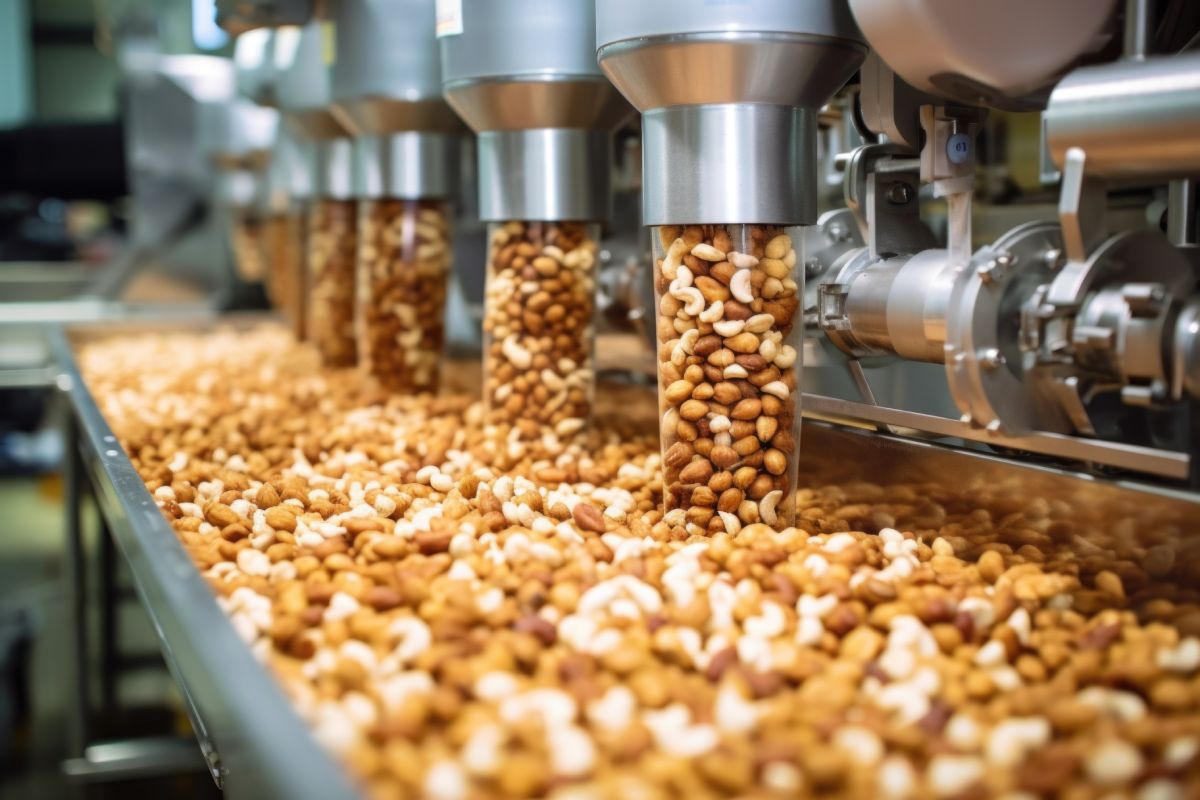



Product Lifecycle Solutions
Food & Drink Manufacturers
In large-scale food and drink manufacturing, where delivering exceptional taste to the public is important, access to comprehensive, accurate, and compliant ingredient information is crucial. We recognize this need and provide solutions to meet these industry-specific challenges.
- Utilize the R&S Development Dashboard to access essential ingredient information, streamlining your product development process.
- As recipes evolve, watch them seamlessly transform into labels complying with your market’s regulatory standards and detailed specification sheets addressing consumer inquiries.
- Rest assured that the ingredient and recipe data development pipeline is accurate and that your labeling meets rigorous regulatory compliance standards.
This system, along with our
recipe software solutions for food industries
, is designed to elevate the efficiency and compliance of medium to ample food and drink manufacturers, ensuring that every product released not only delights consumers but also adheres to the strictest industry regulations.
Restaurant Chains
We specialize in delivering a digital solution that’s a perfect fit for the dynamic environment of restaurant chains. Our platform extends our renowned Recipes & Specifications development system, meticulously tailored for food cost and calculating recipe costs, specifically designed for the restaurant industry. We also integrate seamless communication with suppliers, comprehensive allergen and nutrition declaration and traceability, reinforcing our commitment to providing our clients with a comprehensive, value-driven solution.
- Develop and scale recipes on a user-friendly dashboard, ensuring consistency across all servings and plate sizes with our
recipe database manager for restaurant chains.
- Precisely calculate menu pricing, leveraging real-time ingredient cost data for optimum profitability. This feature is particularly useful in food cost analysis, enabling better financial management of your culinary offerings.
- Access detailed information about allergens and nutritional values to meet diverse customer needs and regulatory standards, allowing for accurate tracking of ingredients and their impact on menu items.
This advanced system, serving as a
product lifecycle management processing system
, stores all your recipes and their associated details securely in the cloud, making them easily accessible from any location. It's more than just a tool; it's a gateway to enhancing your service quality, increasing customer satisfaction, and efficiently managing various recipes, mainly when calculating recipe costs and portions.
Food & Drink Recipe Developers
We understand recipe developers' complexities and challenges in the food and beverage industry. We aim to simplify and enhance your recipe development process, freeing you from the cumbersome management of spreadsheets, emails, and PDF documents, often containing fragmented essential information.
- Embrace the power of Recipes & Specifications' intuitive solutions to streamline the entire recipe development journey, from initial creation to the final product.
- Efficiently, within one cohesive system, including food cost calculations, compliance, labeling, and nutritional content. Use our food costing digital solution to ensure accuracy and efficiency in your budgeting.
- Save valuable time and resources, allowing you to focus on innovation and the art of crafting exceptional recipes. Our digital recipe management tool enhances your productivity and creative flow.
Our recipe organizer tool is specifically tailored to support the unique needs of culinary professionals. We’re here to ensure that your creative process is supported by a platform that handles the technicalities so you can concentrate on what you do best – creating products that customers love.
More Details For DevelopersSupplier & Quality Managers
For Supplier & Quality Managers navigating the intricate landscape of supply chain management, We offer a transformative solution. We aim to alleviate the burden of managing supplier information, approvals, packaging, and ingredient specifications, which often involves sifting through many inconsistent and outdated sources.
- Utilize our R&S Development dashboard, a comprehensive and intuitive system for recipe development that centralizes crucial supplier data for both food manufacturers and suppliers.
- Enhance your operations with our digital collaboration features, allowing suppliers to submit documents and data directly into the system via our supplier portal, thus ensuring a streamlined workflow and precise data management.
- Maintaining a vigilant eye on all specifications, accreditations, and certifications guarantees everything stays current and compliant.
The endless chase for accurate supplier information has become a thing of the past. We empower you to focus on what truly matters – maintaining the highest quality and compliance standards in your supply chain. Our tool is more than just a digital solution; it's a strategic ally in ensuring that your supply management processes are efficient, up-to-date, and reliable.
More Details For Supplier & Quality ManagersLabeling and Compliance Specialists
Labeling and Compliance Specialists fulfill a critical role in ensuring products adhere to the highest accuracy and safety standards. Our digital solution is expressly crafted to support these experts in maintaining and surpassing industry and regulatory standards. Equipped with our comprehensive suite of tools, we aim to certify that every label is a beacon of transparency and a reliable source of consumer information, thereby building confidence and maintaining compliance throughout the industry.
- Our digital solution makes it easy to track regulation changes, keeping your labeling practices ahead of the curve and fully compliant.
- Proactively manage labeling risks with our impact analysis and change traceability features, which alert you to potential non-compliance before products reach the market.
- Benefit from automated regulatory updates that ensure your labels reflect the most current legal requirements without manual intervention.
Our Recipes & Specifications solution supports the development and verification of labels and transforms compliance into a seamless aspect of the workflow. Integrating these critical tasks allows you to focus on strategic initiatives that contribute to your brand's overall success and trustworthiness.
Real-world Successes with Our Modules

Angela Cooper
Food and Innovation Technology, KFC
With our new system and the information that it delivers, we now only have to analyse the cooked elements of the product and have seen an almost 10 to 20% reduction in our clinical analysis requirements, with corresponding savings in costs.

Ryan Smith
Fonterra Group
Within a very short space of time we realised that here was a solution that would support our growth, streamline recipe management at all levels across the organisation, and allow us to produce a wide range of standard and one-off reports, safe in the knowledge that we are working with highly accurate and up-to-date information.

Michelle Frame
Food Innovation Director, Colony Brands
This shed new light on our existing recipes, allowing us to refine and improve these by standardising on a smaller number of ingredients – saving money and ensuring that we could meet competitive price points. We can now also undertake least cost formulation when developing new recipes and can compare these against current recipes to achieve commonality across ingredients and eliminate further unnecessary costs.

Greg Bonnefin
Newly Weds Foods
As well as radically improving all aspects of our business, the system has allowed us to improve relationships with our suppliers and customers. We rely on it and our customers can rely on it.
Why Choose Our Recipes and Specifications Digital Solutions
Elevate your product development process with our state-of-the-art automated solutions, ensuring remarkable quality and unmatched accuracy with ease.
Your Operations, Our Digital Solutions
Customized Setup
At FoodChain ID, we configure our system for the nuances of your target market’s regulations and your business’s unique demands, ensuring a perfect fit. Our tailored setup is designed to streamline your operations, enhance efficiency, and simplify compliance, laying a solid foundation for innovation and growth. With our digital solution for food, you gain the agility to manage specifications, develop recipes, and share product information effortlessly. By aligning with your business type, we empower you to manage your product data confidently, knowing it adheres to the required standards. This approach ensures you can focus on what you do best: creating outstanding food products that stand out in the market. With FoodChain ID, you have a solution that meets the exact definition of your business needs in the food industry.

Collect Specifications
Establish a single source of truth for all your ingredients with FoodChain ID’s Recipes & Specifications system. Our comprehensive platform empowers you to integrate supplier specifications seamlessly into your product development, streamlining your data accuracy and compliance. Eliminate the challenges of data inconsistency and maintain control with our robust specification repository. Our system is aligned with the latest industry standards and regulatory requirements, ensuring you’re always ahead of the curve. Invite suppliers to add ingredient details online or tap into our ready-to-go nutrient databanks for instant access to reliable data. Revolutionize your specification management and ensure precision with FoodChain ID’s innovative solution.

Create Recipes
Craft recipes with speed and ease using our platform, which is tailor-made for the food industry, enabling you to develop recipes that are quick to create, meet your critical targets, and instantly show the effects of any modifications on cost, nutrition, allergens, and ingredient lists. Our solution embeds the industry’s best practices to facilitate real-time updates and incorporate feedback for continuous improvement. With hierarchical recipe management, ensure uniformity and precision across your entire product line, standardizing recipes for your entire portfolio. Automated checks for nutrition and allergens are built in, safeguarding food safety and reinforcing consumer confidence. Embrace our system’s comprehensive version control for meticulous tracking and archiving. Store your recipes in our secure and accessible system, streamlining your operations. Enhance your recipe development with FoodChain ID and achieve industry-leading standards with ease.

Share Labels and Product Information
Sharing your product information becomes effortless. Our system is engineered to automatically generate recipe information sheets, finished product specifications, and nutrition labels, focusing on accuracy and compliance. This intuitive solution adapts to the ever-changing regulatory landscape, ensuring your labels reflect the latest standards. It meticulously evaluates the impact of any ingredient alterations on label data, seamlessly updating allergen statements, nutritional details, and more. Position your brand at the forefront of trust and transparency.

Grow with FoodChain ID
FoodChain ID’s Recipes & Specifications system is your ally in fostering growth and innovation. Our solution unlocks extra time for you to craft more innovative and successful products, enhancing the quality and variety of your offerings. By streamlining your business processes, our system brings operational efficiency to the forefront, reducing time-to-market and boosting your competitive edge. Stay ahead of regulatory changes with our meticulous specs, recipes, and label management. Embrace technological advancements within the food industry and elevate your business. Grow and innovate with FoodChain ID, where efficiency meets excellence.

Features of Our Recipe Management System
Our Recipe Management System is more than just an application – it’s a vital part of your operations, ensuring everything you offer is ready for the market, compliant, and easy to maintain in the future. Here’s what you can look forward to with our system:
Data and Calculations
A central hub for recipe data and menu items, with regional nutritional databanks and instant updates on cost and allergens. Our comprehensive solution provides:
- Centralize ingredient and recipe data for accuracy and consistency.
- Access region-specific nutritional rules and information for compliance.
- Adjust recipes accurately with loss and gain calculations.
- Receive real-time updates on nutrition, allergens, and costs.
- Maintain detailed logs of all changes, updates, comments, and approvals.
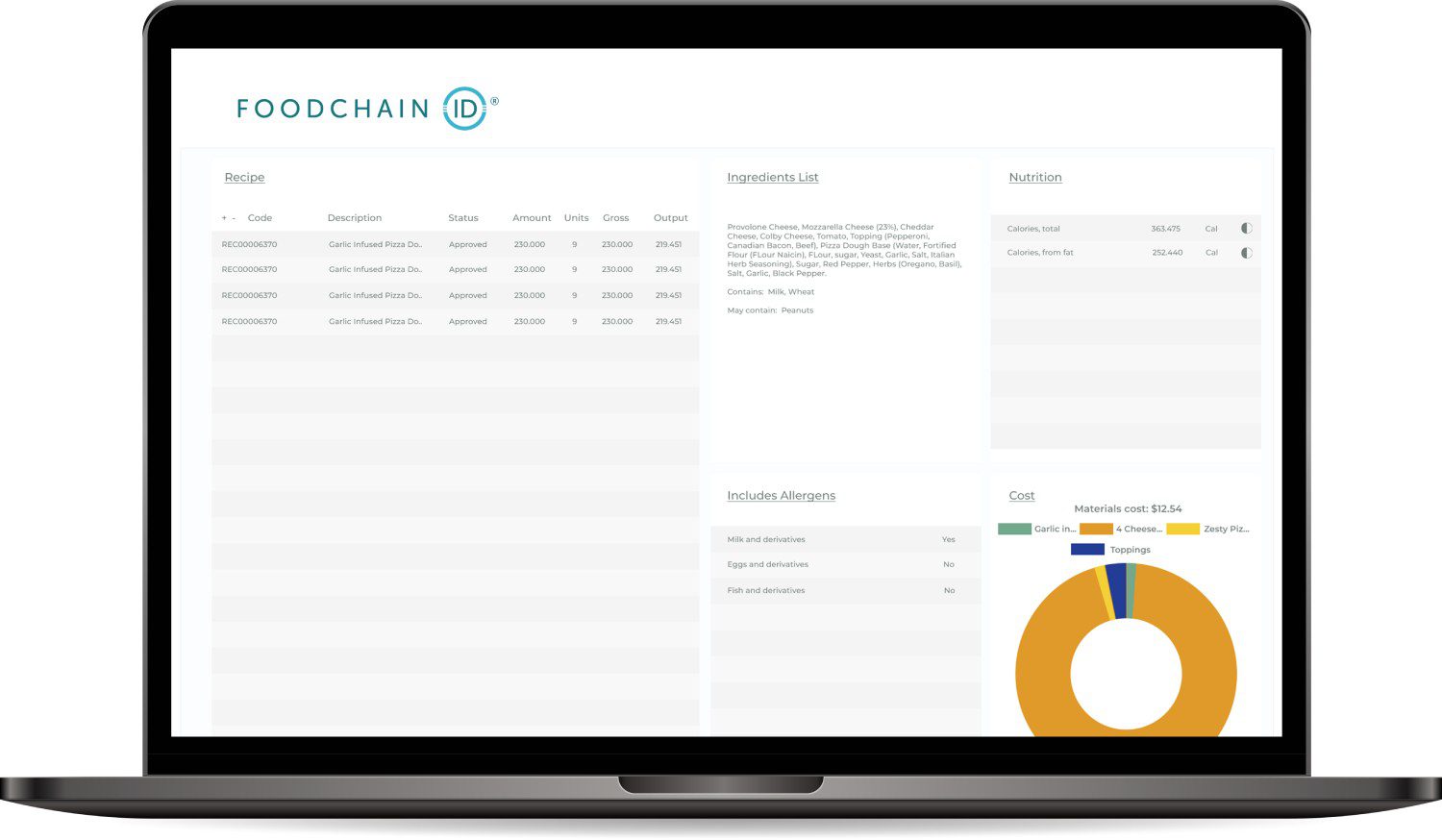
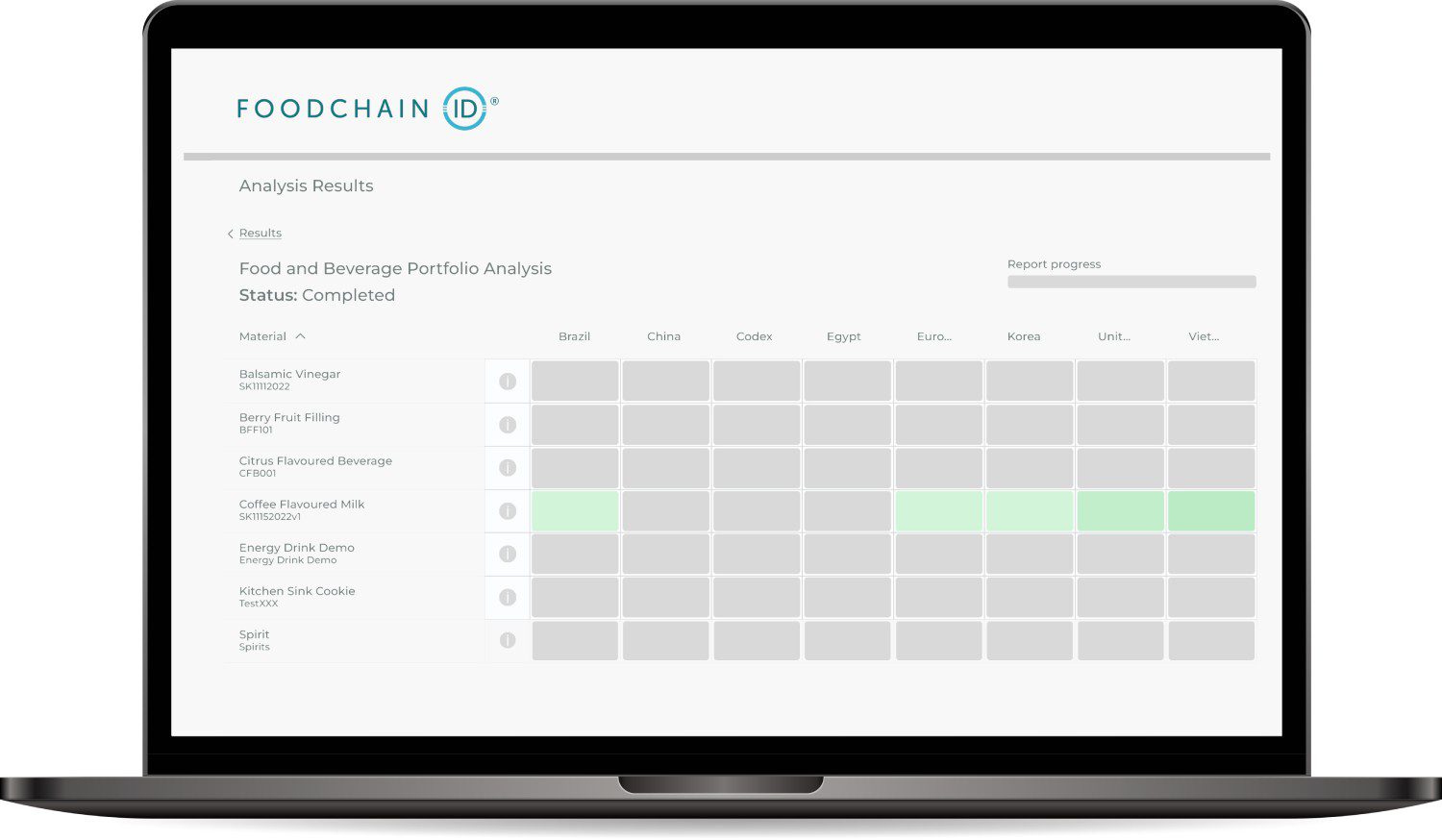
Suppliers and Compliance
Direct supplier information access, with tools for automated compliance and cross-site ingredient control. Enhance your operations with our specialized features:
- Efficiently manage supplier site approvals and collaborations.
- Automatically check compliance for up-to-date certifications and regulations.
- Maintain recipe accuracy consistently across manufacturing sites.
Recipe and Data Labels
Easy recipe sheet creation with a compliant label design for multiple markets. Our robust features include:
- Automatically create detailed product data sheets for transparent stakeholder communication.
- Verify ingredient and packaging accuracy for consumer trust.
- Produce compliant nutrition labels automatically.
- Adapt labels for regional compliance in international markets.
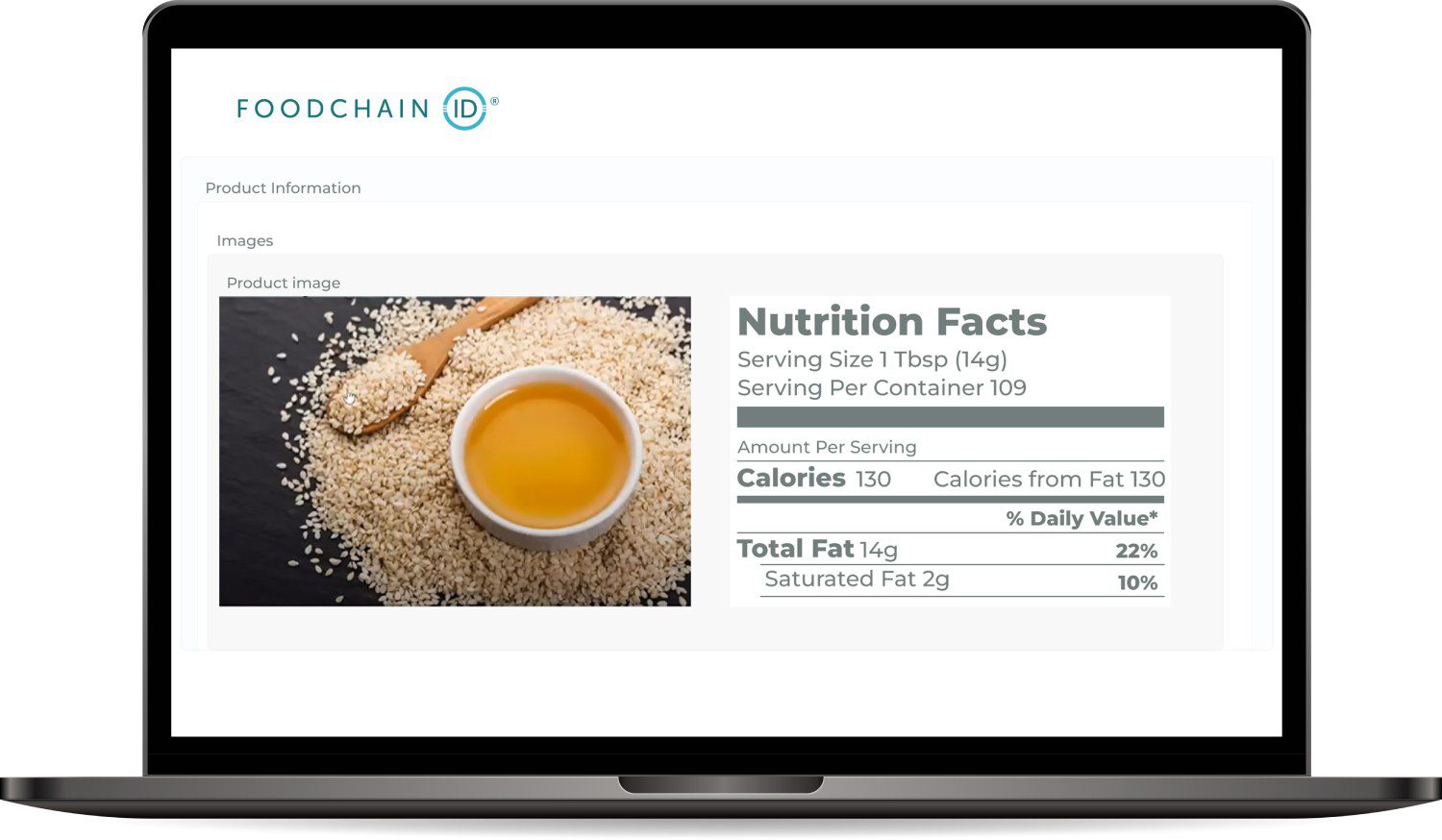
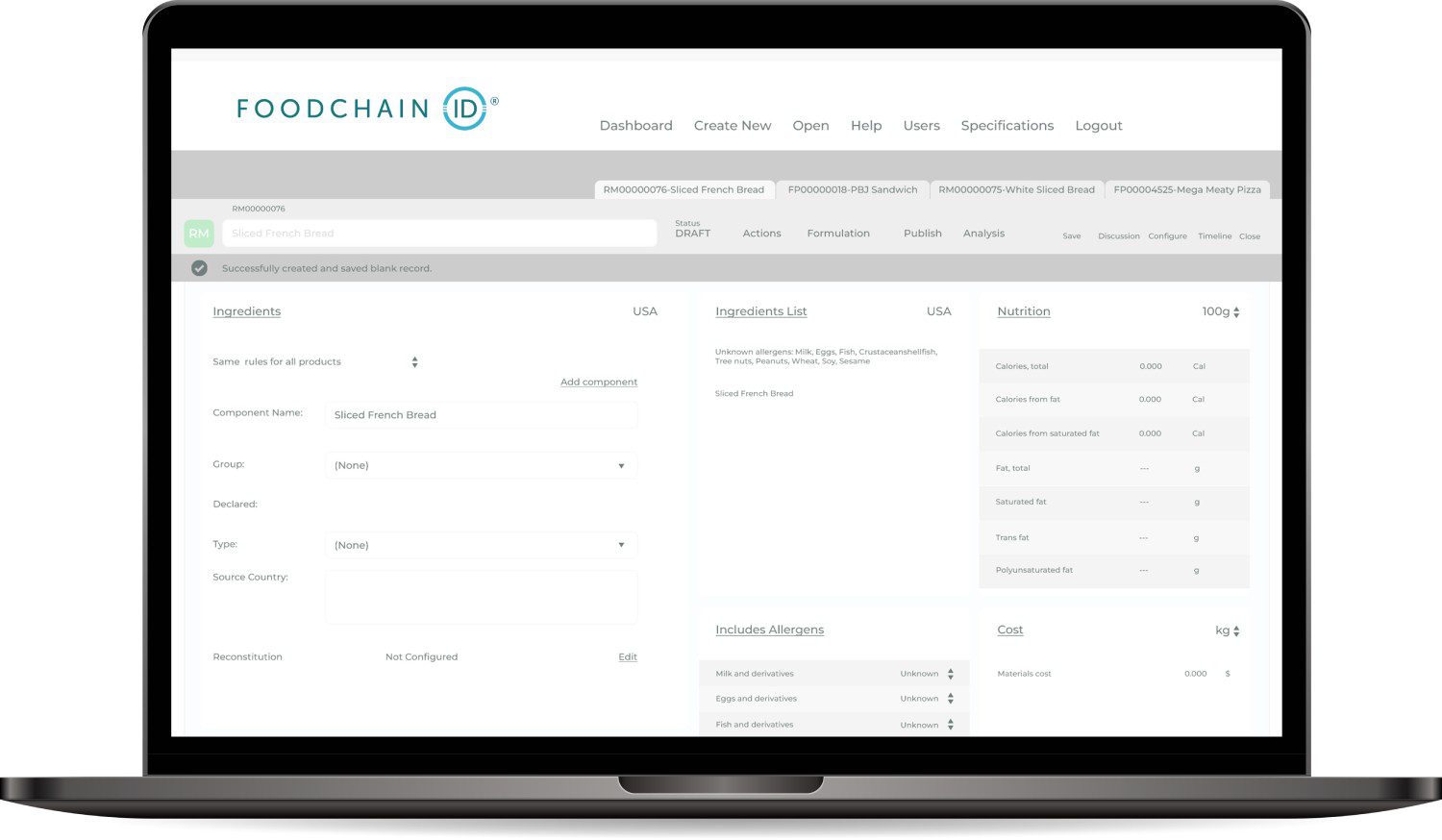
Scalability and Adaptability
Enterprise scalability with customizable dashboards and comprehensive API integration. Our system is designed to grow with your business needs, offering:
- Customize recipe creation to highlight essential aspects.
- Easily extend the attribute and workflow model to meet your specific needs.
- Facilitate easy system integration with extensive API options.
- Tailor your dashboard for enhanced control and easily produce reports that meet your needs.
Integrations
Experience streamlined integrations with our Recipes & Specifications comprehensive system, offering a suite of options that enhance your operational efficiency:
- Access accurate nutrition data from geographically specific databanks.
- Automatically check compliance for your market with allowed additive levels and more.
- Simplify system-wide data integration with standard JSON API.
- Tailor API integrations using JSON, XML, and SOAP to fit business needs.

Streamline New Product Development
Choose Recipes & Specifications Digital Solutions for Streamlined and Trusted Compliance
Transform Your Innovation Process with a Recipe Management System
What is a Recipe Management System?
A Recipe Management System (RMS) is a critical component of your Product Lifecycle Management (PLM) footprint, providing specialized functionalities tailored to the unique demands of the food sector. It’s adeptly designed to manage and streamline recipe management, optimizing the progression of a recipe from inception to market launch with the ability to integrate other key data or systems needed.
Within the food manufacturing landscape, the importance of an RMS is paramount. It streamlines the management of supplier data, collection, and approval of raw material and packaging specifications—tasks that are too specialized and iterative for standard ERP, CRM, and MES systems. As the diagram will show, an RMS is engineered to navigate the fast-paced changes in food regulations and emerging risks with tailored precision.
It standardizes the formulation process, promoting development compliance, ensuring the integrity of the Bill of Materials (BOM), and overseeing the technical product information such as specifications and pack copy. The RMS seamlessly integrates within the PLM framework by
- Obtaining cost details from ERP or Master Data Management systems is essential for operations.
- Providing BOMs to ERP, MDM, or MES systems serves as an essential tool in the management process.
- Transmitting technical pack copy or label data to artwork management systems, which maintains the integrity and traceability of recipe data.
- Communicating technical requirements for new raw materials and packaging to the purchasing or quality system.
This integration, with our
specialized solution integration for PLM
, enables the RMS to reinforce the PLM process, elevating efficient compliance and ensuring market-ready products. It has become crucial technology companies use to manage ingredient and recipe information, improve efficiency, and develop and adapt products quickly. Creating a new recipe or updating a menu item becomes a streamlined process with this app. Our recipe management solution is a powerful organizer and model for businesses aiming to streamline recipe management and ensure their offerings are always market-ready, compliant, and of the highest quality.
Understanding PLM and PDM in Our Digital Solutions
Product Lifecycle Management (PLM)
Product Lifecycle Management (PLM) is an encompassing software system and methodology that guides the entire life-cycle of a product from its initial concept, through development to production, launch, and eventually, retirement.
- PLM is essential for managing each phase of a product’s journey to market.
- It plays a critical role from the first stages of development to the product's end of life.
- PLM systems are designed to streamline workflows, enhance cross-team collaboration, and ensure regulatory compliance throughout product development.
Key Functions of PLM
- Streamlining and optimizing processes for efficiency and effectiveness.
- Improving collaboration and communication among diverse teams and with chain supply partners.
- Reducing the time it takes to develop and bring a product to market.
- Ensuring that all products meet regulatory compliance requirements.
- Enhancing the overall quality of the final product


Basics of Product Data Management (PDM)
Product Data Management (PDM) is considered a subset of PLM that deals explicitly with managing detailed product data, including but not limited to specifications, formulations, and other essential information and documentation. Our
product data management software solutions
enhance this capability, ensuring that all product data is meticulously organized and easily accessible.
- PDM is the repository where intricate product data is kept, managed, and validated to ensure precision and compliance with product data management digital solutions.
- This system plays a pivotal role in maintaining the integrity and accessibility of product data throughout the product development lifecycle, serving as a fundamental source of truth within a company's enterprise structure.
FoodChain ID Efficiency
At FoodChain ID, we’ve meticulously crafted our digital solutions to seamlessly blend Product Lifecycle Management (PLM) and Product Data Management (PDM), offering a unified and comprehensive approach to managing your product’s journey.
In our Recipes & Specifications (R&S) platform, we’ve established a centralized hub that simplifies collaboration and data management. We enable you to collect and organize information electronically in a standardized format, seamlessly integrating it into specifications and formulas. This creates a single source of truth for your team, ensuring that everyone is aligned and working with accurate, trusted data.
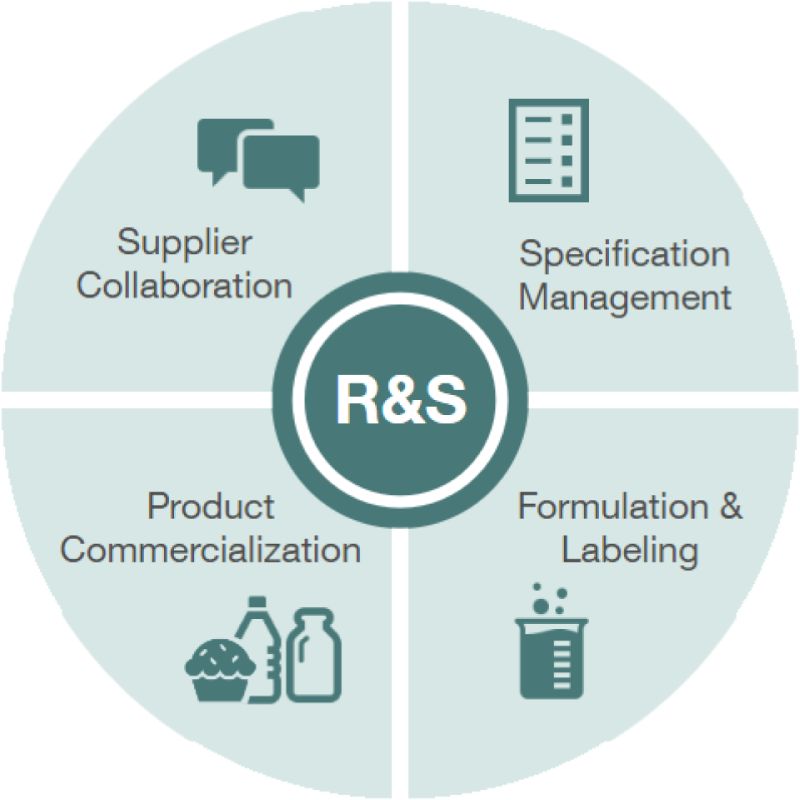
Benefits of an Integrated Approach
By intertwining PLM and PDM needs, we provide you with numerous benefits that significantly elevate the efficiency and effectiveness of your operations:
With FoodChain ID, you’re not just adopting a digital solution; you’re embracing a partnership that equips you with the tools to navigate the complexities of product development with unmatched agility, precision, and compliance.
Management
Workflows
Making Capabilities
Readiness

Collaboration

and Quality
Transform Your Product Journey with FoodChain ID.
Discover the full potential of your product with our advanced integration of digital solutions!

FAQ
FoodChain ID’s automation system significantly enhances recipe management by automatically synchronizing all updates and changes across the product lifecycle. This real-time automation stands out for its efficiency, making the change management cycle of products much more streamlined and effective.
Yes, the FoodChain ID program can create and modify recipes effortlessly. Designed by and for professionals, the program simplifies product development and modifications, leveraging a purpose-built and intuitive user experience.
FoodChain ID supports important aspects of product and supplier quality, allowing you to manage critical quality and compliance information along with critical reviews and approvals. These features are integral to the system, guaranteeing that you are audit-ready and that your products consistently adhere to standards.
Recipes & Specifications is comprehensive and professionally maintained, ensuring the utmost reliability and accuracy. It is a dependable source of truth for all your recipes and ingredients, along with other leading brands around the world.
Absolutely. The FoodChain ID digital solutions are tailored to optimize the workflow for food industry professionals. It enhances efficiency and productivity, making it a valuable tool in the professional food industry.
Indeed, FoodChain ID’s system is capable of handling a large number of recipes and extensive data. Its modern, scalable technology platform stands out, offering seamless management and organization for all of your trials, recipes, and related data, simplifying innovation and collaboration for food industry professionals.
Streamline Your Operations
